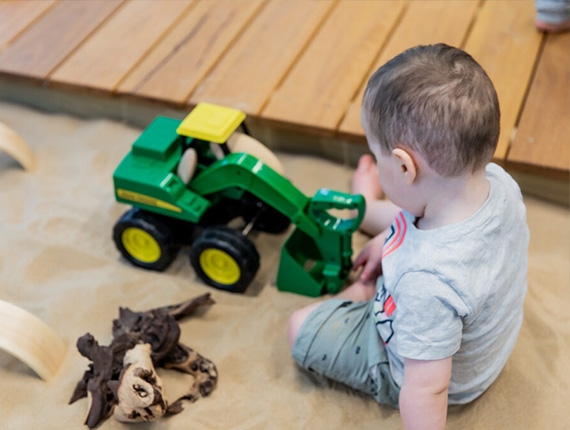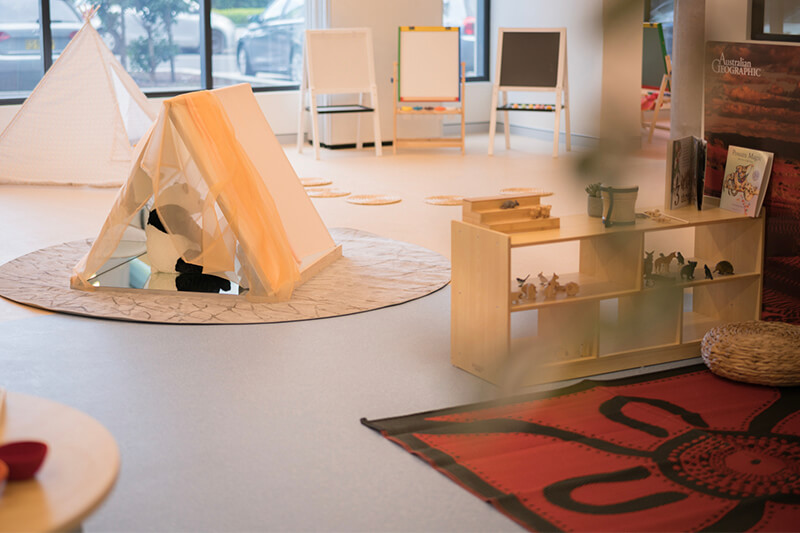Explore Our Centre
Learn more about our facilities and our unique approach to early childhood education.
Book A Tour Now“Every day, in a 100 small ways, our children ask, ‘Do you hear me? Do you see me? Do I matter?’ Their behavior often reflects our response.”
– L.R. Knost (Author of “The Gentle Parent: Positive, Practical, Effective Discipline”)
Reggio Academy’s child-led curriculum pays homage to the concept of ‘everyday, experiential learning’. Our centre directors and staff work tirelessly through on-going training to provide the most innovative learning experiences for your child. We believe that even the simplest tasks can grab the curiosity of our children and lead to the greatest learning projects.

Play is a fundamental part of childhood and is a springboard for learning. Loris Malaguzzi, the psychologist behind the Reggio Emilia approach explained that ‘children are active constructors of knowledge’ and they express their learning through ‘100 languages’. Our educators draw from this approach by providing children with an environment that they can freely explore, guiding them through their ‘play’ and encouraging children to investigate, generate hypotheses, test their hypotheses and encouraged to portray their understanding through one of the symbolic languages, including drawing, sculpture, dramatic play, and writing.

We believe that each child is strong, capable and resilient; rich with wonder and knowledge. Our Philosophy rides on the coattails of the innate curiosity of children and aims to assist them with understanding their world and who they are in it..
Our approach to learning is divided into five key areas:
We recognise the potential of young children to question, reflect, problem solve, theorise, experiment and express their findings through at least ‘a hundred languages’. We are a centre that is focused on providing children with the opportunity to be independent learners. We encourage children to develop their ideas over time, to discuss new ideas, to negotiate over, to induce conflicts, to revisit, to see progress and to see the progression of ideas. The curriculum provides a stimulating and challenging basis to develop a diversity of ideas, which are rich in the children’s interpretive/representational expressions.

Sensorial classrooms were designed by Malaguzzi to help children explore the world around them. The media is always presented in an artistic and aesthetically pleasing manner to invite children to touch, admire, explore and it should be creatively inspiring. Children are invited to explore the materials before posing questions about what the material is for and how it can be used. These media projects are revisited throughout many projects to help children see the possibilities and to appeal to their creative thought processes.

Consistent with Howard Gardner’s notion of schooling for multiple intelligences, the Reggio Emilia approach calls for the integration of the graphic arts as tools for cognitive, linguistic, and social development. Presentation of concepts and hypotheses in multiple forms of representation — print, art, construction, drama, music, puppetry, and shadow play — are viewed as essential to children’s understanding of experience. Through the ‘100 languages’ children are seen as being extremely capable in expressing, exploring, and connecting their thoughts, feelings and imaginings.

Children are born researchers and samples of their innate learning can be documented through interactions. The Reggio inspired approach is lead by the child’s curiosity, connection to the world around them, and the belief that children have the ability to develop their own potential. Play is driven by the children’s interests, questions, and the world that they live in. The opportunity for children to create their own research and explorations helps to develop independence and creative thinking. Much like a story, a research project may have a beginning, middle, and end that develops over time.

Collaborative group work, both large and small, is considered valuable and necessary to advance cognitive development. Children are encouraged to dialogue, critique, compare, negotiate, hypothesize, and problem-solve through group work. Within the Reggio Emilia approach, multiple perspectives promote both a sense of group and the uniqueness of self.

Learn more about our facilities and our unique approach to early childhood education.
Book A Tour Now